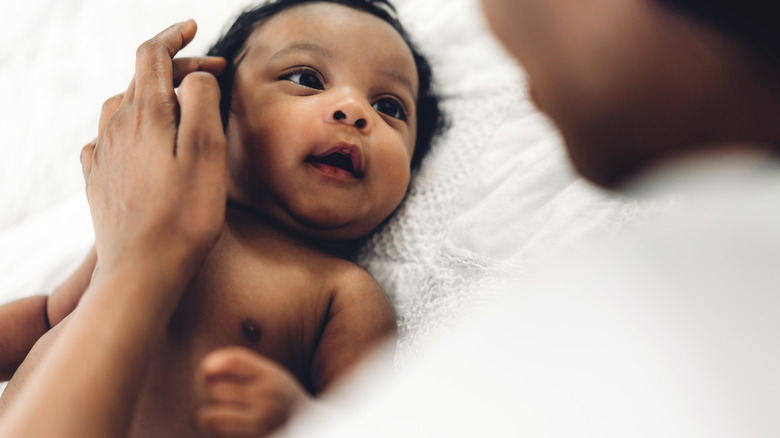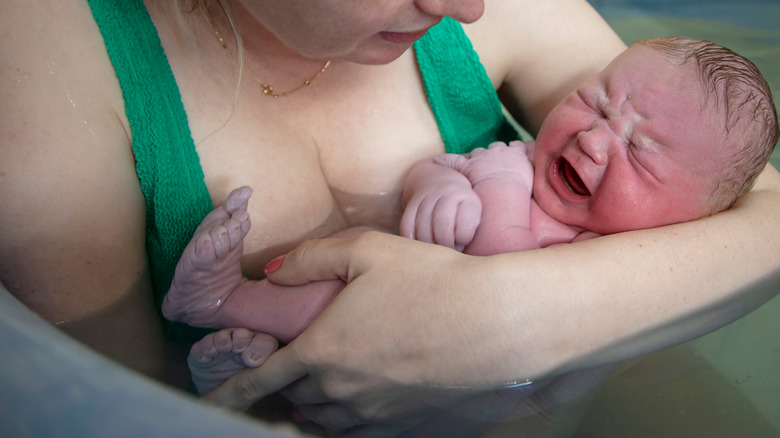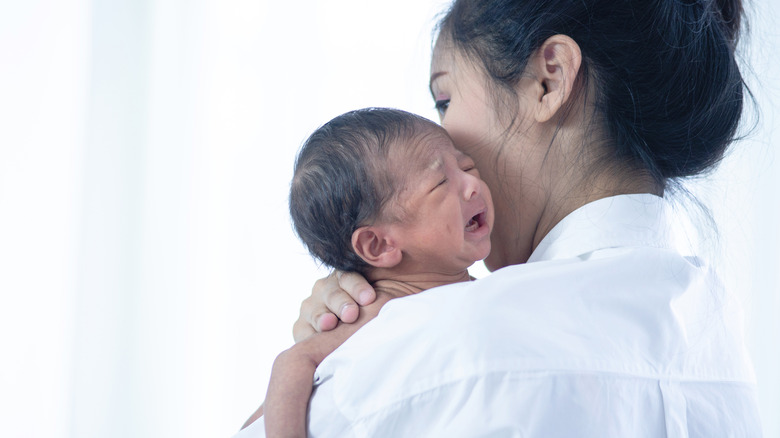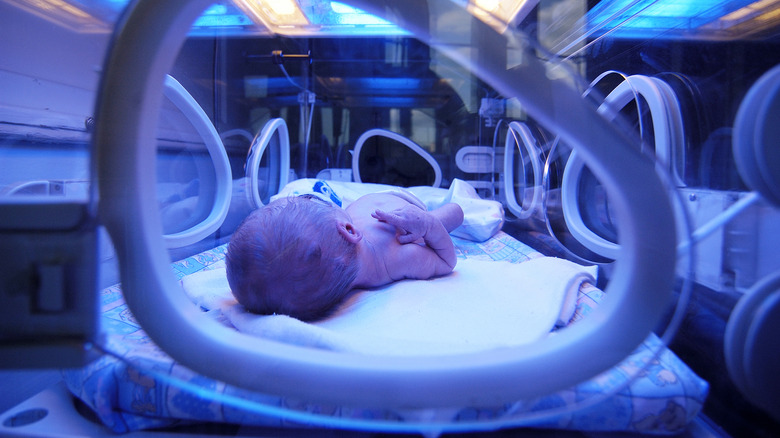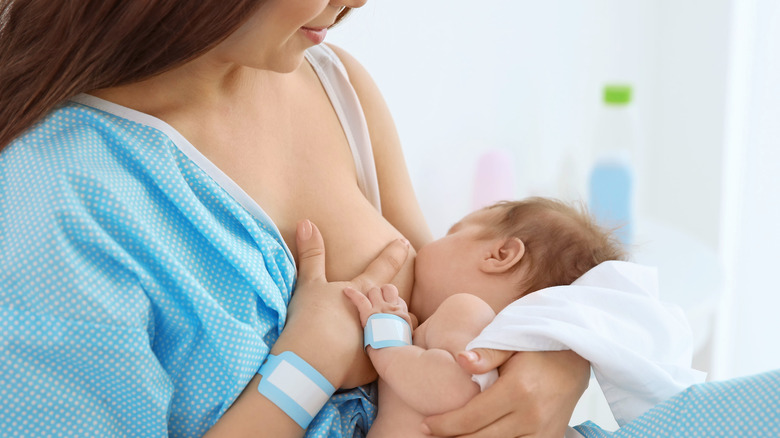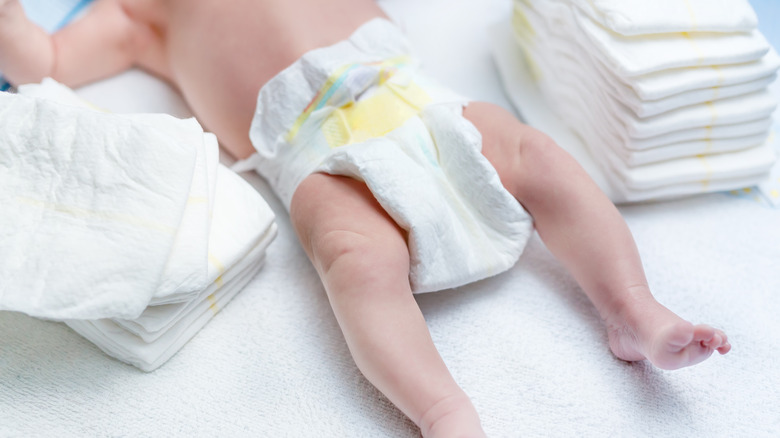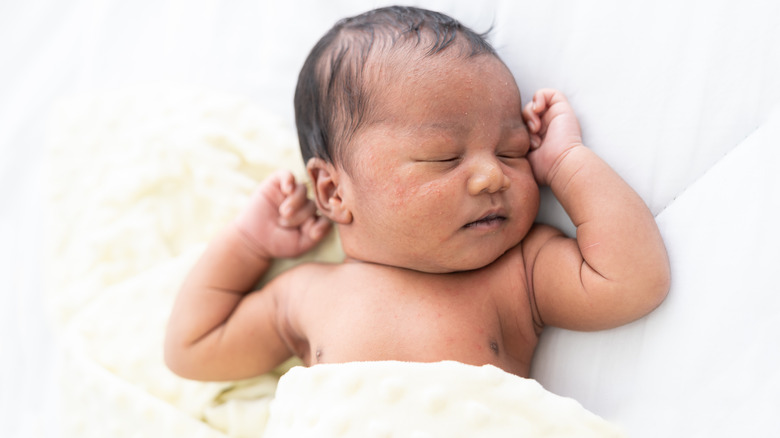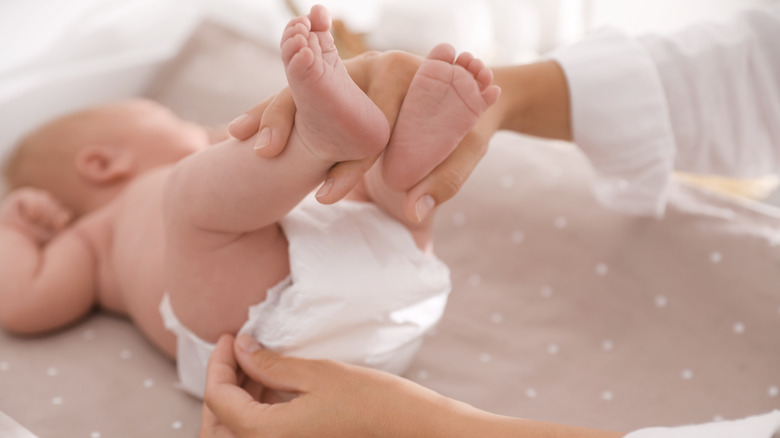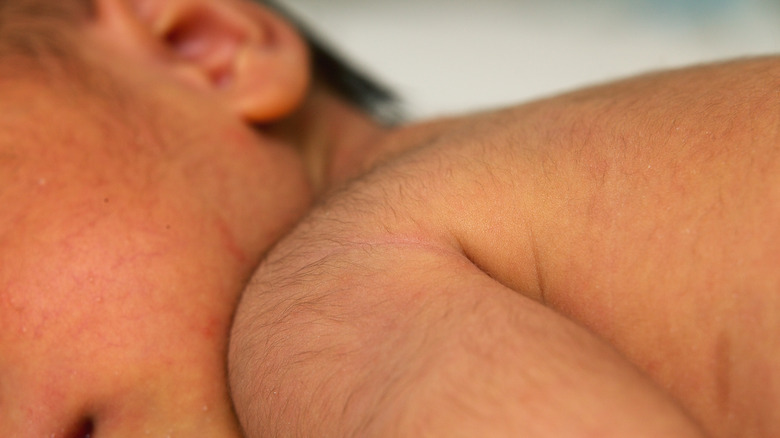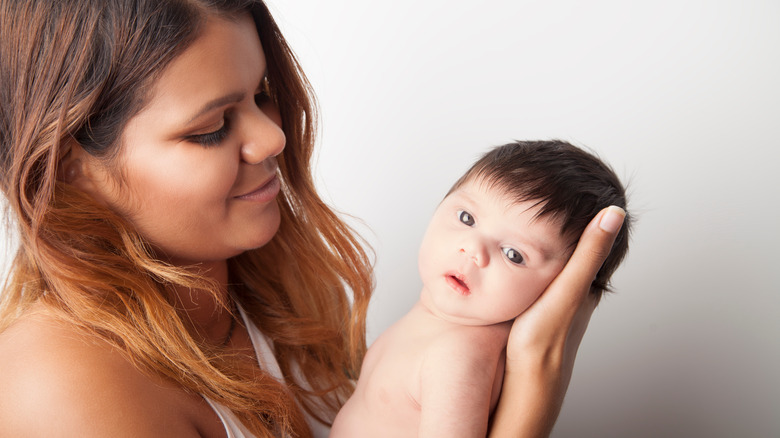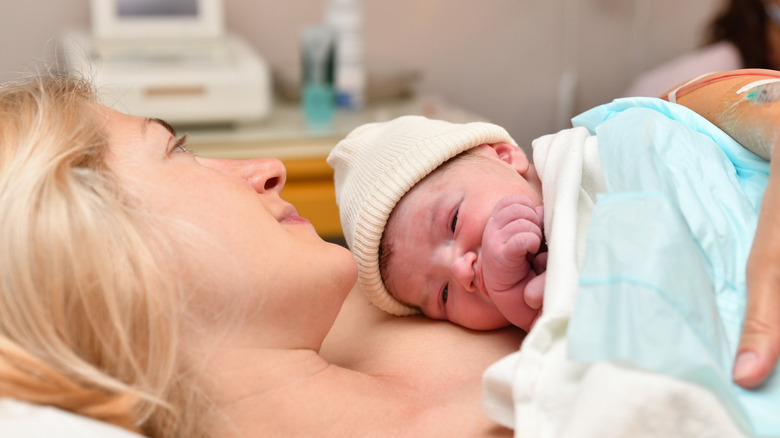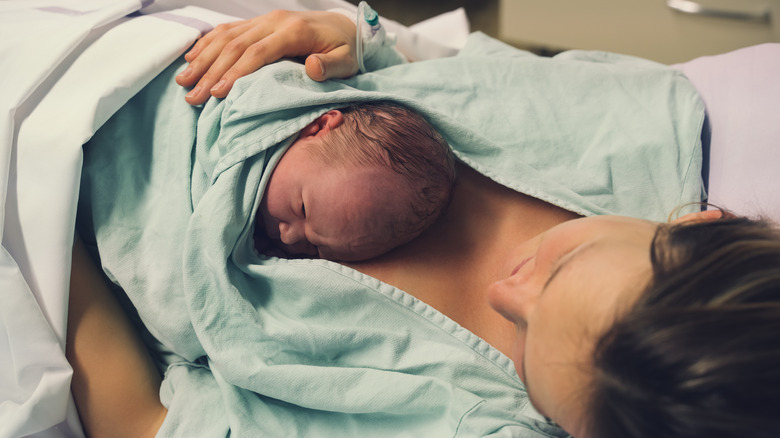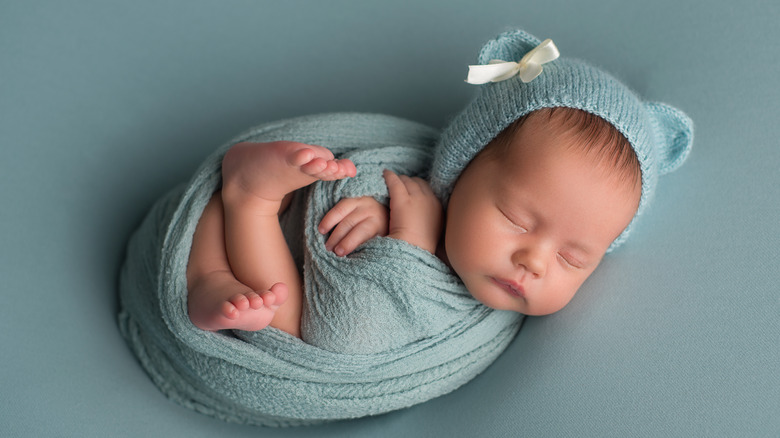When You're Born, This Is What Happens To Your Body
Being born would appear to take place in a moment — the moment baby emerges. However, it's actually part of a lengthy transition, according to Acute Care Testing. Although the first observable sign may be the baby's first breath, there is a complicated set of changes that need to take place in order for a newborn to take that first breath and survive beyond it. These changes began in the womb and will continue for hours, days, and even weeks after birth.
Prior to your birth, you relied on the placenta to sustain your life. The placenta is the organ that your mother's body grew, temporarily, to support your life while you were in the womb (via Mayo Clinic). The placenta was connected to you through your belly at the site of where your belly button is now (clinical term: umbilicus). It supplied all of your oxygen and nutrient needs while also filtering the related waste products from your body.
Once you were born, you needed your own circulatory system to support your oxygen needs and your own digestive system to supply you with nutrients and remove waste. And those systems are just two of many your body suddenly had to depend upon once outside the womb. Further, each of those systems has numerous subsystems. In short, a lot happens to your body when you're born. Here are some of the most noteworthy.
Your body has to adapt from living underwater to living on land
The entire time that you were gestating in the womb, you were surrounded by fluid — mostly amniotic fluid, but also small amounts of blood and other organic material such as your own cast-off skin cells and hair. You didn't breathe air; rather, you received oxygen from your mother via the placenta, an organ that your mother's body produced and continued to develop right alongside you to act as your own personal life support system right up until the moment that you are born (via Mayo Clinic). Although at the moment that you're born, you are officially transformed into a landlocked, air-breathing creature, you will still bear a strong resemblance to the fluid-dwelling creature that you were just moments prior.
Immediately after emerging, you are covered in amniotic fluid, blood, and a sticky white substance known as "vernix," according to Medline Plus. The vernix (aka vernix caseosa) helps protect your body from the many months of exposure to water (via Healthline). Still, your skin might crack and peel because that's what can happen when you spend nine months or so suspended in fluid (via Medline Plus).
Your oxygen needs change
Although the human body needs oxygen before it's born, the levels needed in the womb are lower than the levels needed after birth, according to The Conversation. Moreover, the oxygen needs of the fetus are not met through breathing but rather through the circulation of your blood through the placenta. As your blood circulates throughout the blood vessels of the placenta, your blood picks up the oxygen molecules it needs and releases carbon dioxide molecules as waste — just as your lungs will do after you're born (via Children's Hospital of Pennsylvania).
When you're born, your central nervous system sends an immediate command to your lungs. "Inflate," it says. Within around 10 seconds, your lungs will have obeyed the command by drawing in air for the very first time, according to Medline Plus. That first gasping breath begins what will be a lifelong process of your lungs filling with air and emptying that air. Every inhale will expose the blood in your circulatory system to oxygen. Every exhale will release carbon dioxide and make room for more oxygen (via National Heart, Lung, and Blood Institute).
You may develop jaundice
Assuming all has gone off more or less according to plan, your lungs will initiate breathing within seconds of being born (via Medline Plus). However, even in typical, full-term newborn babies, the liver can take more than just 10 seconds to start doing its various jobs, including breaking down waste products produced by the body as a normal part of circulation and respiration.
One such waste product is bilirubin. Bilirubin is the substance left over after hemoglobin (aka rd blood cells) — which carry oxygen throughout the body — reach the end of their life and break down. The liver metabolizes bilirubin by passing it through the bile ducts, where it is mixed with liver enzymes designed for that purpose.
When you're born, your liver may not be as adept at producing those enzymes as your lungs are at getting oxygen into your system. The result can be an excess of bilirubin in the blood. And that can show up as a yellowing of the skin and eyes known as jaundice. In fact, infant jaundice occurs in 60% of full-term babies and 80% of babies born prematurely, according to the University of Rochester. In most cases, it requires no treatment and corrects on its own.
When you're born, you start needing to consume your nutrition by mouth
Before you were born, every nutrient you needed to survive and grow into the person you are now was supplied by your mother via the placenta. This transfer of nutrients was accomplished through the blood vessels contained in the umbilical cord, some of which you shared with your mother (via Children's Hospital of Philadelphia). However, when you're born, the umbilical cord is severed, and you'll have to take in nutrients in another way. That way is through your digestive system.
The digestive system begins with the mouth and ends at the anus, where waste is eliminated from the body (via National Institute of Diabetes and Digestive and Kidney Diseases). In between are the organs of the gastrointestinal tract (i.e., the esophagus, stomach, small and large intestines, and anus) as well as the liver, pancreas, and gallbladder. Prior to birth, your digestive system was developing but it did not yet function. When you're born, your digestive system immediately takes over the entire process of introducing nutrients, digesting them, and then eliminating their waste products.
Soon after you're born, you'll need to get rid of waste
During gestation, Baby's digestive system is still "developing and practicing for the big delivery day, when he'll get his first taste of real food," according to What To Expect. During that time, Baby absorbs nutrients consumed by the mother through the placenta, and more specifically, through the blood vessels of the umbilical cord, according to the Children's Hospital of Philadelphia. The placenta also filters the waste products left over after the nutrients have been absorbed. However, in the third trimester, a small amount of those waste products begin to accumulate in the baby's digestive system — along with discarded cells from the skin, gastrointestinal tract, mucous, amniotic fluid, and even hair (via Medline Plus).
When you're born, one of the first things you'll have to do is to expel whatever waste products have accumulated in your bowels while you were in the womb. These waste products are known collectively as meconium. Meconium, which tends to be black, tarry, and odorless, differs from your future bowel movements because they will contain byproducts of nutrients consumed by mouth — i.e. breast milk or formula (via Verywell Health). You should be done passing all meconium within three to five days after birth, at which point your stools will now solely represent the byproducts of nutrition you consumed by mouth.
Your kidneys won't be totally ready
Before you were born, you relied on the placenta to take care of all of the functions your still-developing body was not yet able to take care of itself (via Mayo Clinic). That includes the filtration and elimination of waste products from the blood. When you're born, your urinary system will take over for the placenta full time (via Medline Plus).
Accordingly, sometime within the first 24 hours of your being born, you should pass your first urine outside the womb. Although, it won't really be your first-ever urine, which you have been producing since 9 to 12 weeks in the womb, according to Medical News Today.
It will still take some time for your kidneys to be able to function at optimal speed and effectiveness, according to Medline Plus, which explained that "the rate at which blood filters through the kidneys ... increases sharply after birth and in the first 2 weeks of life" and continues to improve over time.
Your relationship to your urine undergoes a monumental change
Within 9 to 12 weeks in the womb, your kidneys will have already undergone sufficient development, according to Medline Plus. During the time that you're still in the womb, the urine your kidneys produce is released into the amniotic sac, the balloon-like membrane that contains the fetus in the womb until just before birth. Your urine thus became an important source of amniotic fluid, which you needed to cushion your body, keep your body temperature stable, and keep the membranes of your uninflated lungs from sticking together, among other things (via Medical News Today). In fact, by the time you've been developing for around 20 weeks, urine has replaced 100% of the amniotic fluid that surrounds you.
Being born, however, involves the rupture of the amniotic sac. If it doesn't spontaneously rupture, the mother's medical team will help things along by rupturing it themselves. Accordingly, as soon as you're born, the next time you pee will be outside the womb.
Losing hair is par for the course when you're born
Soon after you're born, you may begin to experience hair loss. As cruel as that may sound, the fact is that newborns are prone to not one, but two different kinds of hair loss. The first is the loss of any residual "lanugo" on Baby's body. Lanugo is a soft, unpigmented hair that grows everywhere that the fetus has skin and hair follicles (with the exception of the palms, lips, and soles of the feet) starting around the 20th week of gestation, according to Healthline. It is believed that the purpose of lanugo is to help support the vernix to adhere to the baby's skin. Lanugo is most abundant at around 28 weeks of gestation, according to Verywell Family, after which it begins to be shed into the amniotic fluid, which is why there may be hair in a baby's meconium, per Medline Plus.
That being said, it is not at all that uncommon for a baby to be born with some or all of their lanugo still present. This is particularly true of premature babies, but there are plenty of full-term babies who are born with it, too. It will fall out in the days and weeks after your birth (via Verywell Family).
You may lose more than just body hair
In addition to losing their lanugo, newborn babies may also lose whatever hair is on their head, according to BabyCenter, which pointed out that "newborn hair loss is perfectly normal and nothing to worry about. Babies often lose their hair during the first six months." There is even a scientific name for this specific type of hair loss: telogen effluvium. However, it is not specific to newborn babies. Telogen effluvium is hair loss related to an interruption in the hair's growth stage, according to the American Osteopathic College of Dermatology.
Every hair has around a three-year growth stage followed by a three- to six-month resting stage. According to BabyCenter, "About 5 to 15 percent of hair on the scalp is usually in the resting phase at any one time, but stress, fever, or a hormonal change can cause a large number of hairs to stop growing all at once," at which point the shedding will inevitably begin when the next growth stage begins. When you're born, the severing of the umbilical cord marks the end of the time when you're bathing in your mother's hormones. As a result, your own hormone levels decrease rapidly, which is a setup for telogen effluvium. But don't feel bad — you're not alone. In fact, your mother is experiencing hair loss after pregnancy as well.
When you're born, your body temperature drops
There is a good reason why you're wearing a sweet little cap in your first baby photo after being born. And it's not because it makes you look so cute (although it does). The reason is that as soon as you're born, your temperature begins dropping as a matter of course — and that's a good thing because a fetus produces around "twice as much heat as an adult," according to MedlinePlus. While you were in the womb, you were always warm, and any excess heat dissipated via your skin, the amniotic fluid, and your mother's uterine wall.
When you're born, by contrast, your days of being suspended in a cozy, temperature-controlled bubble are now over. As such, your tiny baby body has to learn to create its own heat, which it does by burning brown fat, a type of fat unique to newborns and fetuses. Your caregivers will also have to give you an assist — with a hat or a sweater or little booties. Since newborn babies generally don't shiver, it's super important that your caregivers stay on top of keeping you dry and warm. In addition, skin-to-skin contact can be useful as well as comforting to both baby and mother (via BabyCenter).
You're born with an undeveloped immune system, but with a little help from your mother's
Before you were born, you were fully enclosed in your mother's womb. The womb protected you from the outside world, including various disease-causing germs that could make you sick (via Medline Plus). However, there is a downside to all this protection. As soon as you are born, you are immediately exposed to all sorts of germs and without necessarily having developed antibodies to ward them off.
Fortunately, some of the antibodies your mother developed over the course of her life thus far have already been transferred to you via the placenta, and if your mother is breastfeeding, she will transfer even more antibodies to you. But whether or not you are breastfed, your immune system has benefitted enough from the transfer of your mother's antibodies to enable it to respond appropriately and effectively to many vectors of disease. In other words, your immune system has something of a head start at birth. But it has a long way to go, and it will do so in large part through the first years of your life.
Your digestive flora rapidly multiplies
Something that has gotten a lot of attention in recent years is the role of one's intestinal flora in maintaining and supporting good health. According to a 2020 report published in "Annual Reports in Medicinal Chemistry," one's gut microbiota "contains trillions of microorganisms that participate in various physiological functions, including vitamin production, maintenance of intestinal cells, development of the immune system and neutralization of pathogens, drugs and toxins," as well as metabolism.
Prior to your birth, you were contained in the womb's relatively sterile environment (via Medline Plus). As such, your intestinal flora is limited to what you have been exposed to through your mother. "During birth and rapidly thereafter, bacteria from the mother and the surrounding environment colonize the infant's gut," a 2012 study in Clinics in Perinatology explained. This is true whether you are born vaginally or via C-section.
"Infant gut microbiome colonization begins at delivery with exposure to maternal microbes — mostly vaginal and fecal microbes for vaginally delivered babies or predominately microbes from the skin, mouth, and surrounding environment in infants born by cesarean delivery," confirmed The Scientist.

